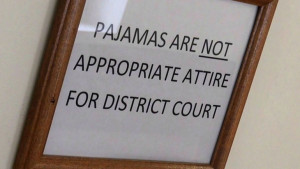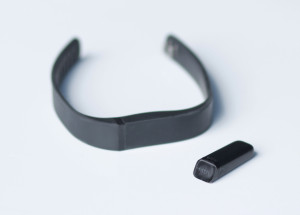 If you are reading this, you likely have an upcoming court date and aren’t sure how things work – including what to wear.
If you are reading this, you likely have an upcoming court date and aren’t sure how things work – including what to wear.
Different courts have different rules, but across the board, it is important to dress appropriately and in a way that indicates your respect for the court. If you are not attired properly, the bailiff (the court officer) could ask you to leave the courtroom until you have corrected your clothing issue. For example, in most courts, you are not allowed to wear hats, halter tops, midriff shirts, untucked shirts, low hanging pants or other attire that shows too much skin or is otherwise too casual for the courtroom.
A Clerk of Court in Pennsylvania recently had signs posted in the court room indicating that pajamas are not appropriate court attire. Really! Pajamas! You would think that would be an obvious “what not to wear” but clearly, in that courtroom, it had happened one too many times.
So, what do you wear? A suit is nice. But if you wear one or not, always be tidy and presentable. Men can safely dress in slacks and a button down shirt. Ladies can wear the same or a skirt (make sure it is knee length or just above – no mini-skirts, please) and low-heeled shoes.
Again, the overall tone is to show the court respect both by your actions and your attire. Just keep the pajamas at home and you should be fine.
See the no-pajama article by clicking here.

 As an attorney, I guide my clients not to publish their “moving on” moments on facebook or other social media and just keep it off social media period. Maybe your spouse may feel jealous of your latest loves after seeing you online going out night after night in downtown Nashville. Maybe not. But, your shared moments are well-documenting what the court would likely see as Inappropriate Marital Conduct – which is grounds for divorce in Tennessee. In other words, you are building a substantial case against yourself, selfie by selfie, all without your spouse or his/her attorney lifting a finger, other than saving the pictures to be used at trial. And, even if you delete content in a dramatic effort to clean up your social media history, it is still discoverable. Even deleted, once posted, it never actually goes away. People have long memories. The internet’s is longer, as in forever.
As an attorney, I guide my clients not to publish their “moving on” moments on facebook or other social media and just keep it off social media period. Maybe your spouse may feel jealous of your latest loves after seeing you online going out night after night in downtown Nashville. Maybe not. But, your shared moments are well-documenting what the court would likely see as Inappropriate Marital Conduct – which is grounds for divorce in Tennessee. In other words, you are building a substantial case against yourself, selfie by selfie, all without your spouse or his/her attorney lifting a finger, other than saving the pictures to be used at trial. And, even if you delete content in a dramatic effort to clean up your social media history, it is still discoverable. Even deleted, once posted, it never actually goes away. People have long memories. The internet’s is longer, as in forever. A Clerk of Court in Pennsylvania recently had signs posted in the court room indicating that pajamas are not appropriate court attire. Really! Pajamas! You would think that would be obvious “what not to wear” but clearly, in that courtroom, it had happened one too many times.
A Clerk of Court in Pennsylvania recently had signs posted in the court room indicating that pajamas are not appropriate court attire. Really! Pajamas! You would think that would be obvious “what not to wear” but clearly, in that courtroom, it had happened one too many times. If you are already have an attorney, contact her first and let her know you’ve been served. She will need the subpoena to evaluate it and your next steps. Time may be of the essence, so deliver it promptly to your lawyer.
If you are already have an attorney, contact her first and let her know you’ve been served. She will need the subpoena to evaluate it and your next steps. Time may be of the essence, so deliver it promptly to your lawyer. After viewing part of the new OJ drama on television last night, I recalled seeing the white bronco drama unfolding on my own small television one summer law school. The trial. The glove. The compliments on counsel’s hair. The verdict. It was fodder for a very hungry news machine. As I watched the white bronco speeding down the highway again last night, I considered what the coverage of such an event would be now. It would “telegraphed” by every iphone, tweet, Instagram, website, text, Snap chat, facebook post, blog and so forth now. The frenzy would make shark week look like your kid’s fish bowl.
After viewing part of the new OJ drama on television last night, I recalled seeing the white bronco drama unfolding on my own small television one summer law school. The trial. The glove. The compliments on counsel’s hair. The verdict. It was fodder for a very hungry news machine. As I watched the white bronco speeding down the highway again last night, I considered what the coverage of such an event would be now. It would “telegraphed” by every iphone, tweet, Instagram, website, text, Snap chat, facebook post, blog and so forth now. The frenzy would make shark week look like your kid’s fish bowl.